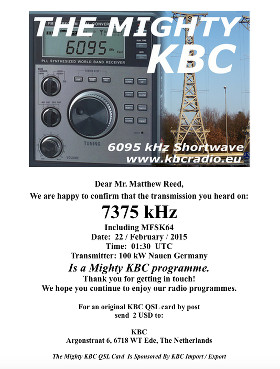Here’s something I haven’t received for many years: a QSL card. Technically, it’s an electronic QSL card (sometimes called an eQSL) from The Mighty KBC, a shortwave station located in Germany.
The Mighty KBC broadcasts music programs up to two hours weekdays and seven hours weekends on 6095 kHz to Europe. But every weekend, The Mighty KBC also airs a two-hour broadcast aimed at Canada, the United States, and South America on 7375 kHz. “The Giant Jukebox” show, presented by Eric van Willegen, starts at 0000 UTC on Sunday, which is equivalent to 8:00PM EDT on Saturday.


